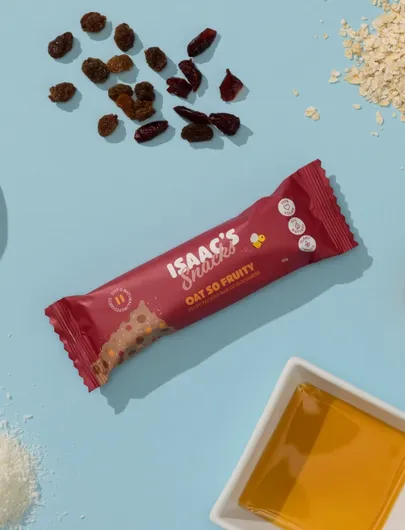Back
Muesli bars are a very popular snack choice since they are portable, convenient, cost-effective, and provide vitamins, minerals and fibre. A healthy muesli bar should also keep you full between meals. However, it can be difficult to navigate which ones are healthy and which are not. Muesli bars are marketed as healthy snacks, but unfortunately many contain added sugar, refined starch and fat, are highly processed and lack sufficient fibre to keep you satiated until your next meal. Don't worry, this guide will help you choose a healthy muesli bar!
Ingredients to avoid in muesli bars
- Added Sugars – e.g. sugar, glucose, golden syrup, malt syrup, and fruit juice. Fructose-based sweeteners (e.g. honey, dried fruit and fruit purees) are damaging and addictive.
- Sorbitol – an artificial sweetener and gastric irritant.
- Added fats (e.g. butter and cream) – are high in saturated fat, which can damage the cardiovascular system
- Salt – excess salt is detrimental to the cardiovascular system
- Skim milk powder – lacks vitamins and minerals found in regular milk as these are removed during processing.
- Processed high GI starches – e.g. wheat starch, wheat puffs, wheat flakes, wheat flour, rice flour, rice crisps, maltodextrin, maize starch and maize flour.
- Chocolate or yoghurt compound – high in saturated fat and sugar
- Food additives – artificial colours and flavours and other additives – e.g. soy lecithin. Additives are used to improve taste, appearance, quality, stability and shelf life. Some additives may result in gut damage and hyperactivity in children
- Sulphites – trigger asthma attacks. Sulphites are suspected mutagens and teratogens (cause birth defects). Side effects include gastric irritation, nausea, diarrhoea and skin rashes.
Best ingredients for muesli bars
- Grains - e.g. oats, barley, quinoa. Whole grains are usually rich in fibre but can have a high glycaemic index (GI) if it has been overly processed
- Dried fruit - provides carbohydrates, fibre, micronutrients and phytochemicals. It may contribute to tooth decay, and some dried fruit may contain added sugar so they're best in small amounts.
- Dietary fibre (inulin/psyllium husk)
- Milk powder/solids and whey/milk protein.
Ingredients that should be present in moderation
- Honey – is low GI and contains small amounts of proteins, enzymes, amino acids, minerals, trace elements, vitamins, aroma compounds and polyphenols (micronutrients that can prevent disease)
- Coconut – provides nutrients fibre, micronutrients and saturated fat
- Vegetable oil – (e.g. sunflower and canola oil) contain n-6 polyunsaturated fats, which may protect the cardiovascular system, but they are also calorie-dense.
Check the ingredients list
Choose muesli bars that have:
- higher quantities of nuts, whole grains, oats, nuts and seeds
- a short list of ingredients
- no added sugars, fats, processed starches, sulphites, salt, artificial sweeteners etc.
Always read the nutrition information panel
- check that one serving is equal to one muesli bar - ideally less than 143 Cal/per serve
- less than 1.5 g saturated fat/100g
- less than 15 g sugar/100g
- more than 4g fibre/100g
Nuts and dried fruit will increase the fat and sugar content of the muesli bar. These are in fact “good fats” and the sugars in dried fruit come with many other nutrients. Nuts are rich in fibre, healthy fats, protein, vitamins and minerals. Food for Health’s Fruit Free Coffee & Cacao bars are a great choice as they are gluten-free, fructose-free, FODMAP friendly and contain only natural ingredients. They also taste amazing and are very filling.
Next time you shop for muesli bars take the time to ensure that you make the healthiest choice possible. Baking your muesli bars at home is another great option as you can cater to your preferred taste and specific dietary needs.

